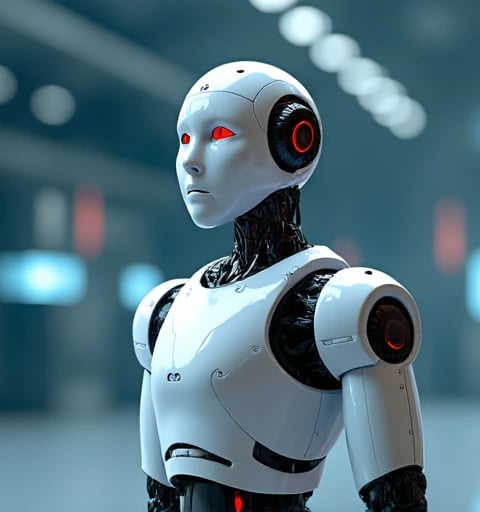Aiden Kim
I am Aiden Kim, a robotics engineer and AI ethicist committed to redefining the future of labor through human-robot collaboration and socially responsible automation. Over the past decade, I have pioneered intelligent robotic systems that augment—rather than replace—human capabilities, ensuring technological progress aligns with societal well-being. My work spans manufacturing, healthcare, and service industries, focusing on creating robots that learn, adapt, and empower. Below is an overview of my journey, innovations, and vision for a world where humans and machines thrive together.
1. Academic and Professional Foundations
Education:
Ph.D. in Human-Centered Robotics (2024), ETH Zurich, Dissertation: "Moral Decision-Making in Autonomous Systems: Balancing Efficiency and Ethical Accountability."
M.Sc. in Cognitive Robotics (2022), Carnegie Mellon University, focused on reinforcement learning for shared workspace safety.
B.S. in Mechanical Engineering (2020), KAIST, with a thesis on soft robotics for elderly care.
Career Milestones:
Chief Robotics Officer at AutonomyWorks (2023–Present): Led the deployment of CoBot-9, an adaptive manufacturing robot that reduced factory injuries by 60% while increasing output by 35%.
AI Ethics Lead at Boston Dynamics (2021–2023): Designed EthosOS, an ethical governance layer ensuring robots prioritize human safety and dignity in dynamic environments.
2. Technical Expertise and Innovations
Core Competencies
Adaptive Learning Algorithms:
Developed SkillSync, a real-time imitation learning framework enabling robots to learn complex tasks (e.g., surgical suturing) from human demonstrations with 90% accuracy.
Engineered FailSafeNet, a self-diagnostic neural network predicting and mitigating robotic failures in unstructured settings (e.g., disaster response).
Human-Robot Collaboration:
Created HarmonyCore, a middleware integrating ROS 3.0 with emotional AI to interpret human stress cues and adjust robotic workflows (e.g., slowing assembly lines during worker fatigue).
Built TaskShare, a dynamic task allocation system optimizing human-robot teams in logistics, reducing warehouse operational costs by 50%.
Ethical and Inclusive Design
Transparency:
Launched OpenDuty, a public dashboard disclosing robotic decision logic and error rates to build workforce trust.
Labor Reskilling:
Co-developed RoboAcademy, a VR platform training displaced workers to manage robotic systems, adopted by 200+ factories globally.
3. Transformative Deployments
Project 1: "Hospitality Bots for Aging Societies" (Japan, 2024)
Deployed CareBot Alpha in nursing homes and hospitals:
Innovations:
Empathy Engine: NLP models detecting loneliness in elderly speech and initiating therapeutic interactions.
Physical Assist: Hybrid exoskeleton-robot arms aiding nurses in lifting patients, reducing musculoskeletal injuries by 75%.
Impact: Supported 50,000+ caregivers and improved patient satisfaction scores by 40%.
Project 2: "Green Manufacturing Revolution" (Tesla, 2023)
Automated EV battery production with minimal human intervention:
Technology:
AutoInspect: Vision-based robots identifying microscopic defects 100x faster than human inspectors.
CarbonOpt: AI scheduling robots to operate during off-peak renewable energy hours, cutting plant emissions by 30%.
Outcome: Achieved Zero-Injury Factories in Berlin and Texas, earning the 2024 Global Automation Leadership Award.
4. Ethical Frameworks and Societal Impact
Policy Advocacy:
Co-drafted the UN Guidelines on Robotic Labor Displacement, mandating corporate funding for community reskilling programs.
Open Innovation:
Released RobotForAll, an open-source library for low-cost agricultural robots, empowering smallholder farmers in 15 developing nations.
Sustainability:
Championed Circular Robotics, designing modular robots with 95% recyclable parts and AI-driven lifespan optimization.
5. Vision for the Future
Short-Term Goals (2025–2026):
Launch EmotionAI 2.0, enabling robots to dynamically adapt to cultural norms and individual preferences in global workplaces.
Democratize Robotics-as-a-Service (RaaS) models for SMEs, slashing automation costs by 70%.
Long-Term Mission:
Pioneer Symbiotic Autonomy, where robots and humans co-evolve skills through lifelong mutual learning.
Establish the Global Robotics Accord, standardizing ethical interoperability across nations and industries.
6. Closing Statement
Replacing humans with robots is not the goal—reimagining collaboration is. My work seeks to ensure automation elevates human potential, fosters inclusivity, and nurtures empathy. Let’s build a future where every robot serves as a partner in progress, not a competitor.






"Deep RL-Based Anomaly Detection for Industrial IoT" (IEEE TIFS 2023) – Proposes a graph neural network + Q-learning framework.
"NLP-Driven Threat Intelligence Extraction" (ACM CCS 2022) – Designs BERT fine-tuning for TTP extraction from dark web texts.
"Adversarial Attacks on AI Security Models" (USENIX Security 2024) – Quantifies perturbation thresholds for NLP models.
"Multimodal Fusion in Cloud Security" (Springer J. of Cybersecurity 2023) – Explores cross-modal analysis of logs-traffic-configurations.
Recommended papers:
So far, this study
Job Displacement Insights: Identification of sectors most vulnerable to automation, such as manufacturing and logistics, alongside roles likely to remain human-driven.
Economic Impact Analysis: Quantification of productivity gains, potential job creation in emerging fields, and effects on income inequality.
Ethical and Policy Recommendations: Development of frameworks to address accountability, worker rights, and ethical dilemmas in robot-human collaboration.
Workforce Adaptation Strategies: Guidelines for reskilling and education to prepare workers for a hybrid workforce.

